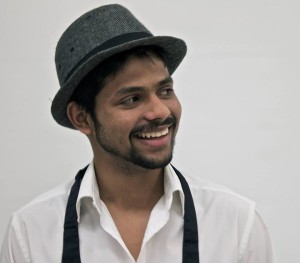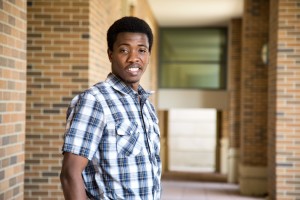Two Wartburg College student-led projects have each received $10,000 Davis Projects for Peace grants.
Junior Amit Bharam will return to his hometown in India where he will help empower young women and replace trees lost to deforestation. Seniors Joseph Tarawali and Michael Brown of Bettendorf will travel to Sierra Leone this summer to equip local farmers with solar poultry incubators that will boost production. This is Tarawali’s second Davis grant.
Philanthropist Kathryn Wasserman Davis founded Davis Projects for Peace in 2007 to celebrate her 100th birthday. Davis, who died in 2013, committed $1 million annually to fund 100 grass-roots efforts by college students. Wartburg students have received a grant every year since the program’s inception. This is the second time Wartburg has received funding for two projects.
Girls Empowerment for Peace and Tree Planting for Sustainability
Bharam grew up in Asade, a remote village where misogyny, caste issues and the dowry system often prohibit women from obtaining an education. In Asade, Bharam will partner with local schools and health care workers to provide hygiene kits and education about the female body, including the menstrual cycle and reproductive health.
“Many young girls drop out of school when they start their menstrual cycle. I want to encourage girls and women at home to participate during these times and give them the confidence to feel that they are respected enough to do so,” Bharam said.
Additionally, he will provide gas stoves to several Mulshi Valley families who still cook over an open fire. This effort will help prevent burns and smoke exposure, as well as prevent deforestation. These same families also will be tasked with protecting newly planted trees that will rebuild the valley’s wooded areas and provide fruit for the community.
Peace Through Poultry Farming Empowerment
A team of Wartburg engineering students designed a new solar incubator system that can help small-scale poultry farmers improve their process and expand the poultry production sector in Sierra Leone for their senior project.
Tarawali was inspired by his father’s own farm, which has about 90 chickens. Though the farm is large compared to others in the region, the egg supply is limited and often he can’t meet the demand.
“If we can get one of our incubators to a backyard farmer, they can put their fertilized eggs in the incubator and in 21 days they will have more chickens,” Tarawali said. “This frees the chicken up to continue to lay eggs during that time.”
One incubator would be shared by several families in the community, allowing more people to be impacted by the project.
“This project has required a lot of long hours in the lab, but we have been motivated because we know we will be helping someone, and we will get to see that in action,” Brown said. “This is an experience I will remember the rest of my life.”
Junior Amit Bharam will return to his hometown in India where he will help empower young women and replace trees lost to deforestation. Seniors Joseph Tarawali and Michael Brown of Bettendorf will travel to Sierra Leone this summer to equip local farmers with solar poultry incubators that will boost production. This is Tarawali’s second Davis grant.
Philanthropist Kathryn Wasserman Davis founded Davis Projects for Peace in 2007 to celebrate her 100th birthday. Davis, who died in 2013, committed $1 million annually to fund 100 grass-roots efforts by college students. Wartburg students have received a grant every year since the program’s inception. This is the second time Wartburg has received funding for two projects.
Girls Empowerment for Peace and Tree Planting for Sustainability
Bharam grew up in Asade, a remote village where misogyny, caste issues and the dowry system often prohibit women from obtaining an education. In Asade, Bharam will partner with local schools and health care workers to provide hygiene kits and education about the female body, including the menstrual cycle and reproductive health.
“Many young girls drop out of school when they start their menstrual cycle. I want to encourage girls and women at home to participate during these times and give them the confidence to feel that they are respected enough to do so,” Bharam said.
Additionally, he will provide gas stoves to several Mulshi Valley families who still cook over an open fire. This effort will help prevent burns and smoke exposure, as well as prevent deforestation. These same families also will be tasked with protecting newly planted trees that will rebuild the valley’s wooded areas and provide fruit for the community.
Peace Through Poultry Farming Empowerment
A team of Wartburg engineering students designed a new solar incubator system that can help small-scale poultry farmers improve their process and expand the poultry production sector in Sierra Leone for their senior project.
Tarawali was inspired by his father’s own farm, which has about 90 chickens. Though the farm is large compared to others in the region, the egg supply is limited and often he can’t meet the demand.
“If we can get one of our incubators to a backyard farmer, they can put their fertilized eggs in the incubator and in 21 days they will have more chickens,” Tarawali said. “This frees the chicken up to continue to lay eggs during that time.”
One incubator would be shared by several families in the community, allowing more people to be impacted by the project.
“This project has required a lot of long hours in the lab, but we have been motivated because we know we will be helping someone, and we will get to see that in action,” Brown said. “This is an experience I will remember the rest of my life.”



